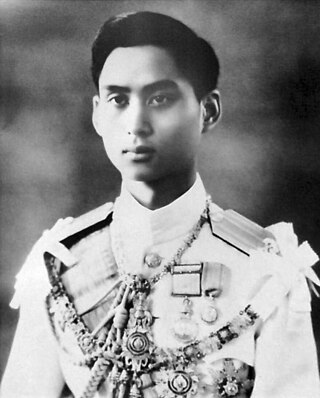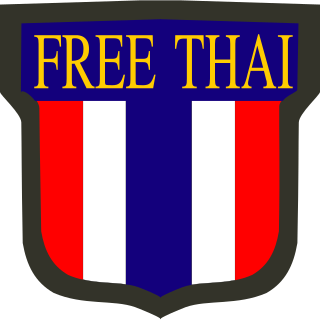
Ananda Mahidol was the eighth king of Siam from the Chakri dynasty, titled Rama VIII. At the time he was recognised as king by the National Assembly in March 1935, he was a nine-year-old boy living in Switzerland. He returned to Thailand in December 1945, but six months later, in June 1946, he was found shot dead in his bed. Although at first thought to have been an accident, his death was ruled a murder by medical examiners, and three royal aides were later executed following very irregular trials. The mysterious circumstances surrounding his death have been the subject of much controversy.

Bhumibol Adulyadej, conferred with the title King Bhumibol the Great, was the ninth King of Thailand from the Chakri dynasty, titled Rama IX. Reigning from 1946 until his death in 2016, he is the third-longest verified reigning sovereign monarch in world history after King Louis XIV and Queen Elizabeth II, reigning for 70 years and 126 days. His reign of over 70 years is the longest reign of any Thai monarch, and the longest native rule of any Asian sovereign.

Kriangsak Chamanan served as prime minister of Thailand from 1977 to 1980. After staging a successful coup, he was asked to become Prime Minister in 1977. He ruled till 1980 and is credited with "steering Thailand to democracy" in a time where communist insurgents were rampant internally and neighbouring countries turned to communist rule following the communist takeover of Vietnam: South Vietnam, Laos, and Cambodia.

The Free Thai Movement was a Thai underground resistance movement against Imperial Japan during World War II. Seri Thai were an important source of military intelligence for the Allies in the region.

The Democrat Party is a Thai political party. The oldest party in Thailand, it was founded as a royalist party; it now upholds a conservative and pro-market position.

The history of Thailand from 1973 to 2001 saw an unstable period of democracy, with military rule being reimposed after a bloody coup in 1976.

Prem Tinsulanonda was a Thai military officer, politician, and statesman who served as the Prime Minister of Thailand from 3 March 1980 to 4 August 1988, during which time he was credited with ending a communist insurgency and presiding over accelerating economic growth. As president of the Privy Council, he served as Regent of Thailand from the death of King Bhumibol Adulyadej on 13 October 2016 until 1 December 2016, when Vajiralongkorn was proclaimed King. At the age of 98, Prem was the longest-living Thai Prime Minister. He is also the oldest regent of any country, surpassing Bavarian Prince Regent Luitpold's record, when he became the regent for king Rama X.

Mom Rajawongse Seni Pramoj was three times the Prime Minister of Thailand, a politician in the Democrat Party, lawyer, diplomat and professor. A descendant of the Thai royal family, he was the great-grandson of King Rama II. His final two terms as PM sandwiched the only term of his brother, Kukrit Pramoj.

Suankularb Wittayalai School literally Rose Garden College is an all-boys secondary school for grades 7 through 12 in Bangkok, Thailand. Founded by King Chulalongkorn in 1882 as a peer's school, its purpose was to educate the children of nobility and the royal household. Suankularb is the oldest public secondary school in the country. Suankularb alumni include eight Prime Ministers of Thailand, nine Supreme Court Chief Justices, five attorneys general, two Fortune Global 500 chief executives, scholars, as well as a number of prominent politicians and businessmen. Suankularb is a member of Jaturamitr group of the four oldest boys' schools in Thailand. Suankularb consists of 11 campuses all over Thailand.

Thanin Kraivichien is a Thai former judge, politician and law professor. He was the prime minister of Thailand between 1976 and 1977. He was then appointed to the Privy Council and became its president in 2016. With the death of Prem Tinsulanonda in May 2019, he become the oldest living former Thai Prime Minister.

The Privy Council of Thailand is a body of appointed advisors to the Monarchy of Thailand. The council, as the Constitution of Thailand stipulates, must be composed of no more than eighteen members. The council is led by the President of the Privy Council of Thailand, currently occupied by former Prime Minister Surayud Chulanont since 27 May 2019. The king alone appoints all members of the council. The council's offices are in the Privy Council Chambers, Phra Nakhon District, Bangkok.

The 6 October 1976 massacre, also known as the 6 October event in Thailand, was a violent crackdown by Thai police and lynching by right-wing paramilitaries and bystanders against leftist protesters who had occupied Bangkok's Thammasat University and the adjacent Sanam Luang, on 6 October 1976. Prior to the massacre, thousands of leftists, including students, workers and others, had been holding ongoing demonstrations against the return of former dictator Thanom Kittikachorn to Thailand since mid-September. Official reports state that 46 were killed and 167 were wounded, while unofficial reports state that more than 100 demonstrators were killed. In the "Documentation of Oct 6" project, Thongchai Winichakul argued that official death toll should be 45, including 40 demonstrators and 5 perpetrators, because one demonstrator died in jail after the incident.

Lek Nana was a Thai businessman and politician. He was one of the founders of Thailand's Democrat Party at the end of World War II. Lek Nana served as Deputy Foreign Minister as well as Minister of Science, Technology, and Energy. A Muslim of Gujarati ancestry, he was a senior member of the Central Islamic Committee of Thailand. The Nana area on Sukhumvit Road derives its name from him.

The coup d'état of 8 November 1947 was a military coup d'état that took place in Thailand on the evening of 8 November 1947, ending in the early morning hours of 9 November. The coup ousted the government of Pridi Banomyong front man, Luang Thamrong, who was replaced by Khuang Aphaiwong, royalist supporter, as Prime Minister of Thailand. The coup was led by military supreme leader, Phibun, and Phin Choonhavan and Kat Katsongkhram, allied with the royalists to regain their political power and Crown Property back from the reforms of the Siamese revolution of 1932. The influence of the People Party ended as Pridi left the country on exile.
The year 1946 was the 165th year of the Rattanakosin Kingdom of Thailand. It was the twelfth and last year in the reign of King Ananda Mahidol, the first year in the reign of Bhumibol Adulyadej, and is reckoned as year 2489 in the Buddhist Era.
The year 1975 was the 194th year of the Rattanakosin Kingdom of Thailand. It was the 30th year in the reign of King Bhumibol Adulyadej, and is reckoned as year 2518 in the Buddhist Era.
The year 1977 was the 196th year of the Rattanakosin Kingdom of Thailand. It was the 32nd year in the reign of King Bhumibol Adulyadej, and is reckoned as year 2520 in the Buddhist Era.

The 1985 Thai military coup attempt was a military coup attempt against the government of Prem Tinsulanonda, by former Thai military leaders on 9 September 1985, but a counter-coup by Prem government in the morning led to surrender of the coup forces.
The March 1977 Thai coup d'état attempt was a military coup attempt against the military government of Thanin Kraivichien and junta leader Sangad Chaloryu, by Chalard Hiranyasiri on 26 March 1977, but failed within 12 hours. Chalard was executed one month later without trial, in retaliation of the killing of Arun Thavathasin, close friend of King Bhumibol Adulyadej.















